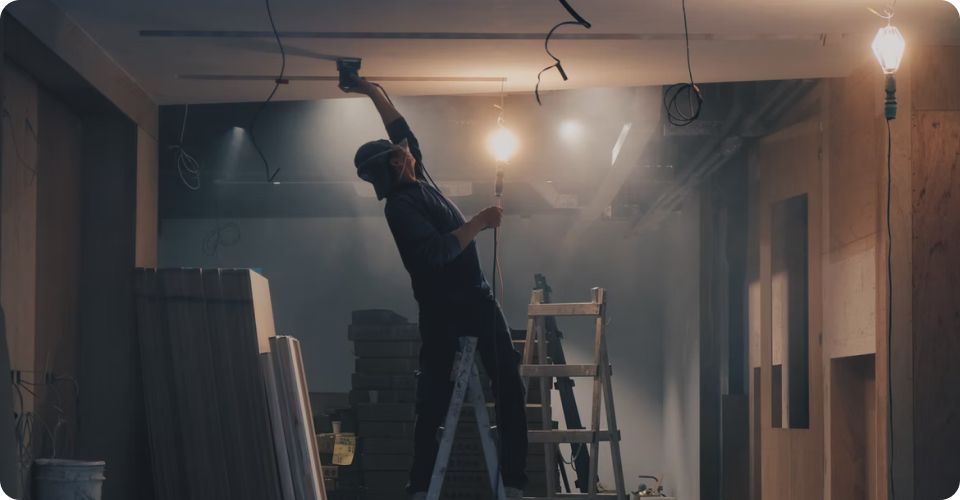How To Utilize AI-Enabled Camera Alerts For Posture Detection In The Workplace
- Published On:
- Camera Alerts, Camera-Powered Alerts
In today’s fast-paced work environments, where efficiency often takes precedence, ergonomics remains a critical factor for long-term productivity and worker well-being. Ergonomics, which focuses on creating safe, comfortable, and productive workplaces, has always been vital in industrial and office settings. However, traditional monitoring and improving workplace ergonomics methods are often time-intensive and reactive, addressing issues only after they arise.
This is where camera-powered posture detection steps in as a game-changing solution. By leveraging AI-powered camera alerts, businesses can monitor worker posture in real-time, providing actionable insights and preventing injuries before they occur. The result? A safer, healthier, and more efficient workforce.
In this blog, we’ll explore the nuances of camera-powered posture detection, its applications, and how AI camera alerts reshape ergonomics. We’ll also discuss the innovative solutions provided by Knowella, a leader in enterprise-grade AI-driven tools for safety and operational excellence.
What Is Camera-Powered Posture Detection?
At its core, camera-powered posture detection combines advanced camera technology with artificial intelligence to observe, analyze, and improve workplace ergonomics. This technology monitors workers’ movements and posture in real-time, identifying potential risks and providing immediate feedback to correct unsafe behaviors.
How It Works:
Camera Setup:
Cameras are strategically positioned to monitor workers in their natural work environments without disrupting workflows.
AI Algorithms:
The system uses machine learning to analyze posture and movement, detecting issues such as slouching, twisting, or repetitive strain.
AI Camera Alerts:
When an unsafe posture is detected, the system triggers a real-time alert, guiding the worker or notifying supervisors to take corrective action.
Data Analysis:
Over time, the system collects data, providing insights into ergonomic trends and helping businesses identify areas for improvement.
Unlike traditional methods, which rely on periodic observations by ergonomic experts, this approach offers continuous, objective monitoring, making it a proactive tool for workplace safety.

The Role of Ergonomics in Workplace Health and Productivity
Ergonomics is more than just adjusting a chair or workstation. It’s about designing environments that fit the needs of workers, ensuring their safety and comfort while optimizing productivity.
The Costs of Poor Ergonomics:
Musculoskeletal Disorders (MSDs):
Conditions like back pain, carpal tunnel syndrome, and repetitive strain injuries are common in workplaces with poor ergonomics.
Lost Productivity:
Discomfort or injuries lead to absenteeism and reduced performance, impacting overall productivity.
Financial Burden:
MSDs cost businesses billions annually in healthcare expenses and compensation claims.
In industrial and office settings alike, addressing these risks is critical. This is where AI-powered camera alerts play a pivotal role in mitigating ergonomic challenges.

Advantages of Camera-Powered Posture Detection
The integration of AI-driven posture detection systems provides several advantages, including:
- Real-Time Monitoring and Alerts
One of the standout features of this technology is its ability to monitor posture continuously and issue AI camera alerts in real-time. These alerts serve as immediate feedback, allowing workers to correct their posture and prevent potential injuries.
For example:
- A warehouse worker lifting heavy boxes incorrectly may receive an alert to adjust their technique.
- An office worker slouching at their desk can be reminded to sit upright, reducing strain on their back.
2. Data-Driven Decision-Making
The system captures and analyzes data over time, providing actionable insights for businesses. For example:
- Identifying repetitive risks in a particular workstation or task.
- Highlighting trends that might indicate a need for better training or equipment adjustments.
3. Enhanced Worker Safety
By addressing ergonomic risks proactively, businesses can significantly reduce the occurrence of MSDs. This not only improves worker safety but also builds trust and engagement among employees.
4. Improved Productivity
A workforce free from discomfort or injuries can focus better on their tasks, leading to higher efficiency and productivity.
5. Cost Savings
Investing in camera-powered posture detection can save businesses substantial amounts by reducing healthcare costs, minimizing downtime, and avoiding compensation claims.
Real-World Applications of Camera-Powered Posture Detection
Industrial Workplaces
In environments like warehouses, factories, and construction sites, workers often perform physically demanding tasks. Posture detection helps reduce strain and injury risks during lifting, bending, or repetitive tasks.
Office Settings
Even desk jobs come with ergonomic risks, such as neck strain or lower back pain. AI-powered systems can monitor posture and recommend adjustments like repositioning screens or chairs.
Healthcare Facilities
Healthcare workers frequently lift patients or handle heavy equipment. Real-time feedback ensures that proper techniques are followed, protecting both workers and patients.
Education and Training
Posture detection tools are also used for training workers in safe practices, providing them with immediate feedback during onboarding or skill development programs.
How AI Camera Alerts Engage Workers
Beyond improving safety, camera-powered posture detection plays a vital role in fostering ergonomic awareness among workers.
Interactive Feedback
Real-time alerts serve as gentle reminders, encouraging workers to maintain proper posture. Over time, this fosters better habits.
Visualization Tools
Some systems provide visual overlays that show workers their posture in comparison to the ideal. This makes the feedback intuitive and actionable.
Gamification
Adding elements like posture scores, leaderboards, or improvement badges can make the process engaging, motivating workers to actively participate in ergonomic improvements.
Knowella: A Leader in AI-Powered Ergonomics
When it comes to implementing advanced ergonomic solutions, Knowella stands out as an industry leader. Their enterprise-grade SaaS platform is designed to empower businesses with innovative tools for safety, compliance, and operational excellence.
What Makes Knowella Unique:
- AI-Driven Cameras: Their technology provides real-time posture detection and AI camera alerts, ensuring proactive risk management.
- No-Code App Building: Customize solutions to your specific needs without requiring technical expertise.
- Comprehensive Features: From configurable form builders to data-capturing drones, Knowella offers a versatile toolkit for modern operations.
Benefits of Partnering with Knowella:
- Streamlined Operations: Automate and simplify safety and quality processes.
- Enhanced Compliance: Meet regulatory standards effortlessly with data-driven insights.
- Operational Excellence: Leverage over 100 pre-built programs tailored to industry needs.
Knowella is your one-stop solution for leveraging AI-powered camera alerts and other cutting-edge technologies to transform workplace ergonomics.
Conclusion
Camera-powered posture detection represents the future of workplace ergonomics, offering real-time insights and actionable solutions to improve safety and productivity. By investing in AI-powered camera alerts, businesses can prevent injuries, foster a culture of awareness, and achieve operational excellence.
Knowella makes this transformation easier than ever. With their AI-driven solutions, you can implement ergonomic improvements seamlessly, ensuring the well-being of your workforce while driving efficiency.
Explore the possibilities with Knowella. Get started for Free today and discover how their innovative tools can help you create a safer, smarter, and more productive workplace.
The primary goal of industrial ergonomics is to create a harmonious balance between workers, their tasks, and the tools they use. Key objectives include:
Discover if AI-powered camera alerts are worth it! Explore their features, benefits, and future trends for smarter security.
In this blog, Read about the top 10 tips for making the most of AI-Powered Camera Alerts, and how Knowella can help you enhance your work.
Maximize your AI-powered camera alerts with these 10 actionable tips for smarter monitoring, safety, & convenience. Explore now!